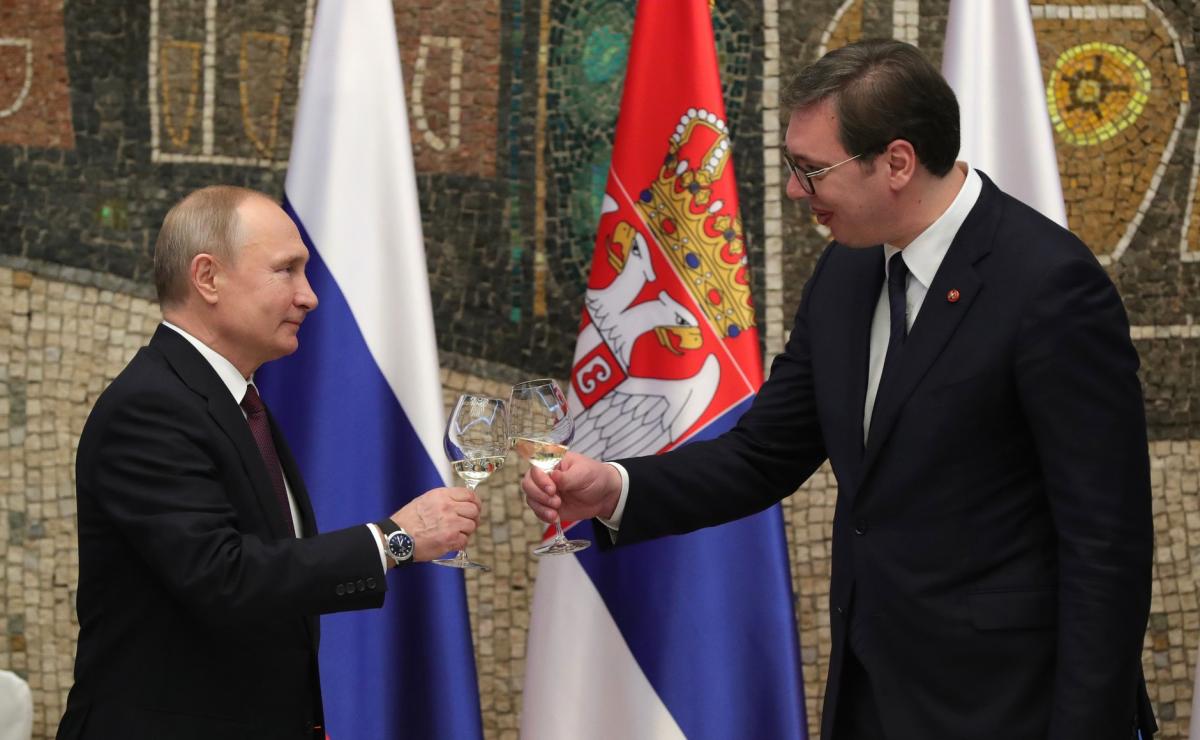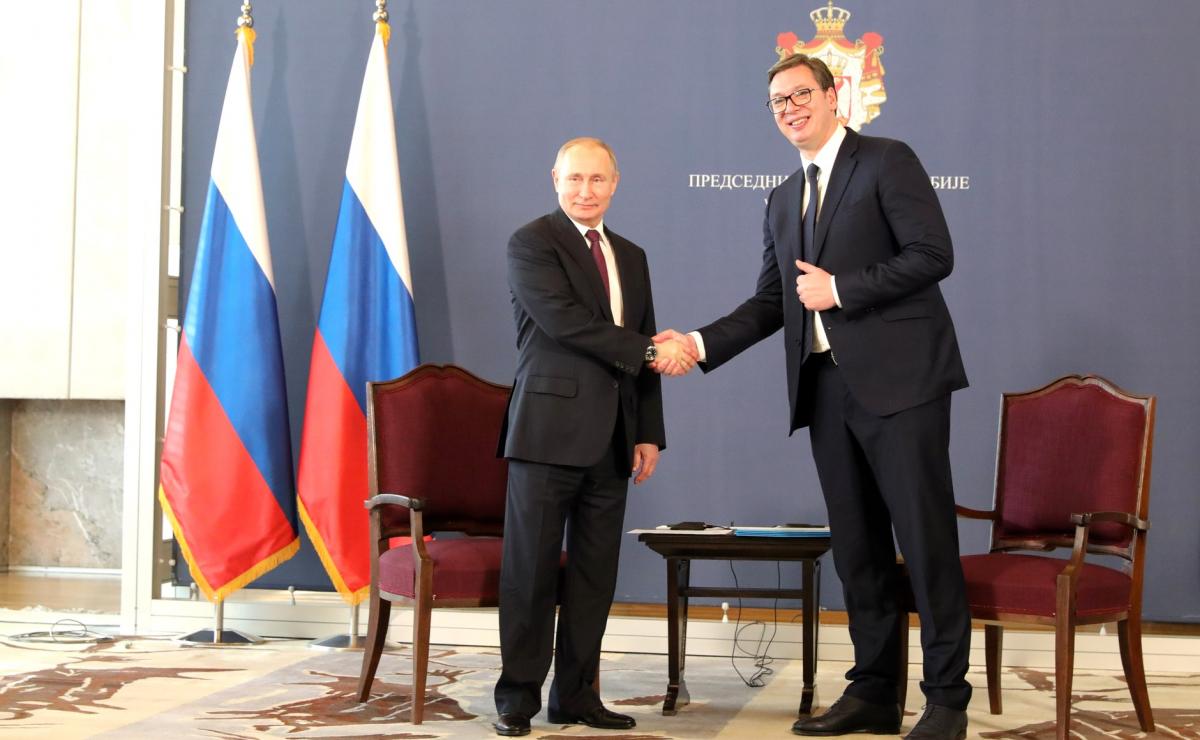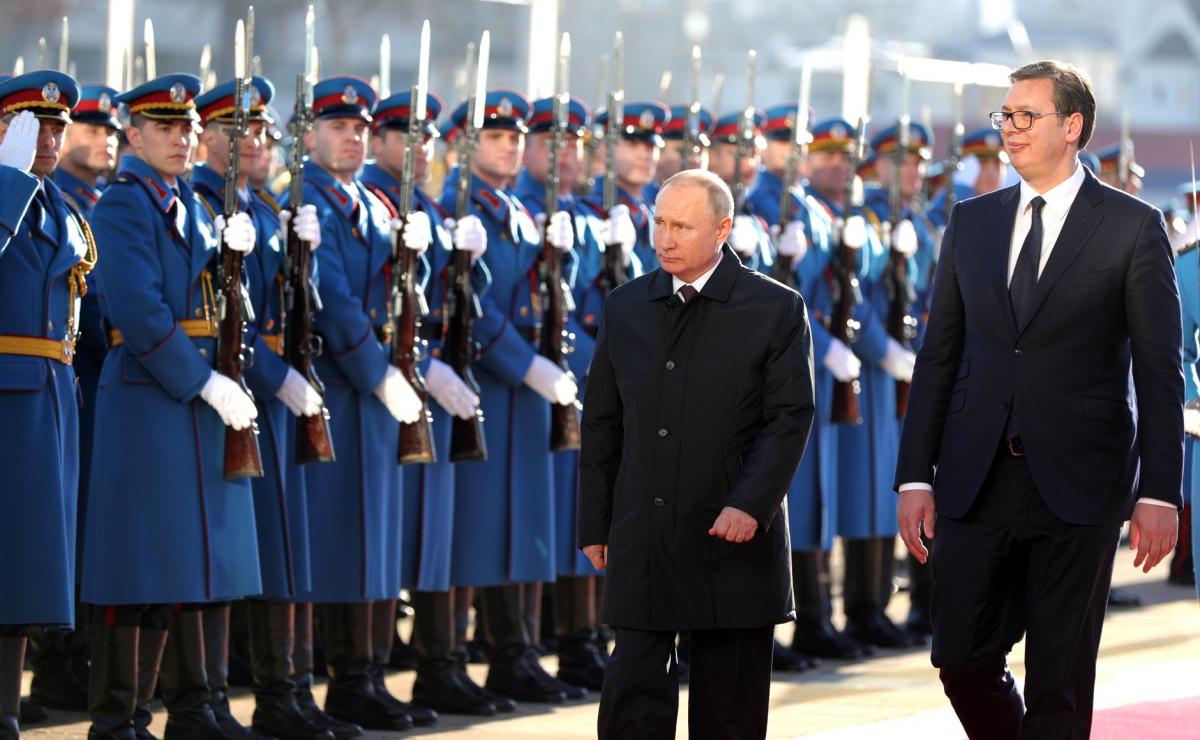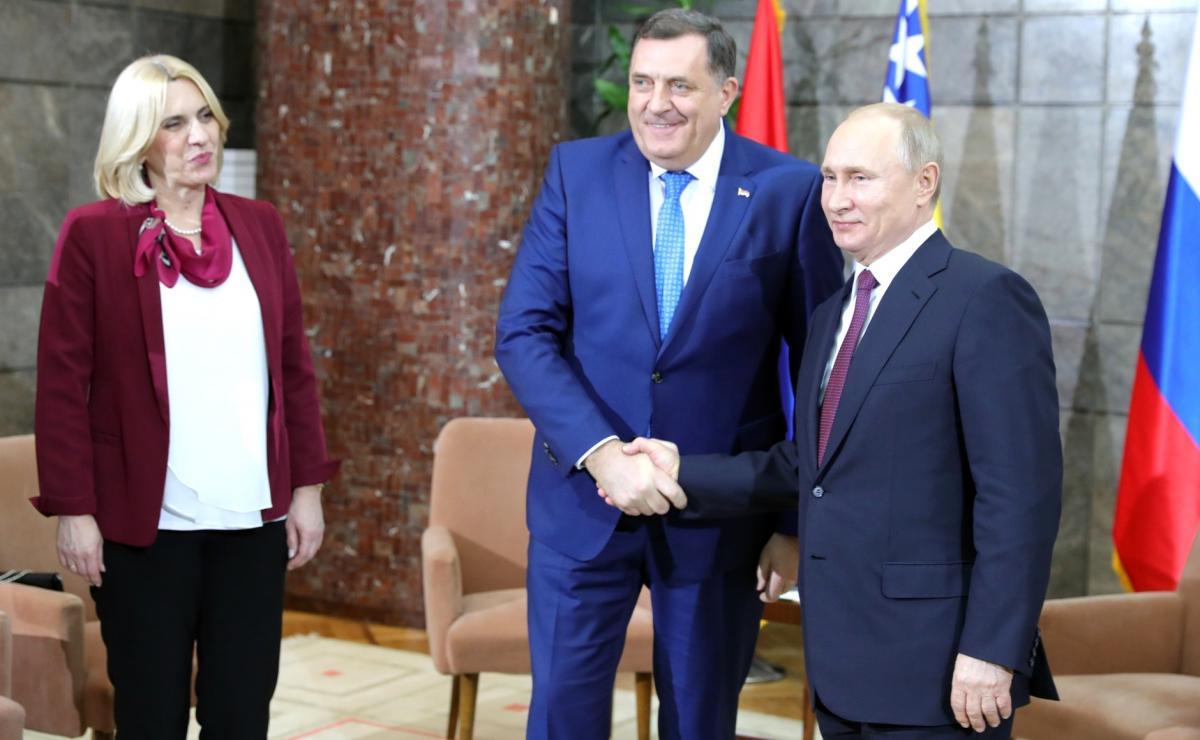It was clear that Vladimir Putin's state visit to Serbia would be a rousing success. Putin, a ranking world leader represents Serbia's historic and current protector. Russia has given Serbia backing on the issue of Kosovo whereas Serbia has never forgiven the West for steamrolling Kosovo's breakaway, and the West is still considered suspect. Although Serbian President Alexander Vucic towers over Putin he was content to bask in Putin's shadow. Putin was tactful enough to say that Russia (as opposed to others and particularly the United States) will not force Serbia to choose between Russia and joining the EU, his visit appeared to underline that Serbia under Vucic is not equidistant between the two.
On January 17, Russian President Vladimir Putin visited Serbia. Many observers noted that Putin's visit was intended to mark Russia's territory in Serbia, a country that aspires to join the European Union.[1]
On January 16, ahead of his meeting with Putin, Serbian President Alexander Vucic stressed his country's strong alliance with Russia, and underlined that he personally always "begs" for Putin's advice on political matters. Vucic said: "I always consult and take advice from President Putin, I ask for his advice, I require his advice, I beg him for advice. I acquaint him with what is happening, and I do not lie, I speak the truth, regardless of whether everything pleases him all the time. And I think this is what President Putin respects very much. And I respect it, because he is the leader of a great country, and I am the leader of a small country, and he shows respect for my country, I am eternally grateful to him for that."[2]
Zarko Obradovic, Chairman of the National Assembly's Foreign Policy Committee and Deputy Head of the Socialist Party of Serbia , also commented on the importance of Putin's visit for Serbia: Obradovic stated: "The visit of the President of the Russian Federation is of great importance for Serbia and is a token of President Vladimir Putin’s respect for our state and our President Alexander Vucic. This visit will undoubtedly strengthen Serbia’s international position, as a friend representing one of the most powerful powers of the world comes to visit us."[3]
Ahead of his visit, Putin gave an interview to the Serbian dailies Politika and Vecernje Novosti, and clarified that Serbia does not have to choose between loyalty to Russia or to the EU. Putin told Vecernje Novosti: "We respect the Serbian leadership's decision to join the EU. Unlike our Western partners, we do not try to pose an artificial dilemma for Belgrade and make Serbia choose whether to be with Russia or with the European Union. In today's global world, integration processes are developing dynamically, involving new countries and alliances and shaping new promising structures. We are convinced, therefore, that neither Serbia's striving for integration into Europe, nor Russia's participation in the Eurasian Economic Union prevents our two countries from strengthening their multi-faceted cooperation."[4]

Putin with Serbian President Alexandar Vucic (Source: Kremlin.ru)

Putin with Serbian President Alexandar Vucic (Source: Kremlin.ru)
Putin Supports Serbia's Concerns Over Kosovo's Army; Vucic: US, UK, And Germany Behind Kosovo's Militarization
Putin's visit also signaled Russia's support for Serbia on the Kosovo issue. In particular, Putin voiced concern over Kosovo's December 14 announcement that it was forming an army. Earlier, the Russian MFA stated that the creation of an army is in violation of Resolution 1244. It is worth noting that the army is expected to total 5,000 soldiers and an additional 3,000 reservists. Kosovo intends to budget 98 million euros per annum to fund the armed forces.
During the visit, Putin stressed that the decision by the Kosovo authorities to create an army is regrettable and can destabilize the situation in the Balkans. Putin commented: "Regrettably, Kosovo’s authorities took a series of provocative steps lately, thus greatly aggravating the situation. In the first place I have in mind their decision of December 14 to form a so-called army in Kosovo. It goes without saying that this is a direct violation of the UN resolution, which does not allow for the creation of any paramilitary forces except for the international UN contingent."[5]
Earlier, on December 14, 2018, Serbian President Alexander Vucic accused the United States, Britain and Germany to be behind the formation of the army Kosovo. "Today it is quite clear that the Albanians and their sponsors never wanted a compromise, it is clear that [standing] behind everything are the United States, Great Britain, and Germany on the issue of the Kosovo army - we are disappointed by this fact, but this is not news for us ," Vucic said.[6]
On December 18, 2018, the head of the Serbian Orthodox Church (TWC), Patriarch Irinej, also said that the army of the "self-proclaimed republic of Kosovo" is created with the help of the United States and other Western countries "governed by their own egotistical interests. The patriarch claimed that the Kosovo army is deliberately targeting the Serbs and their holy sites in Kosovo and Metohija.[7]
Russia’s foreign ministry also published a statement, calling for the demilitarization of Kosovo and warning that Kosovo’s Serbs are in danger of ethnic cleansing. "We are convinced that international presence in Kosovo, first of all the United Nations Interim Administration Mission in Kosovo (UNMIK) and the Kosovo Force, are obliged, in conformity with their mandates and acting on the basis of provision 9b and article 15 of United Nations Resolution 1244, to take urgent and exhaustive measures for the demilitarization and disbanding of any armed units of Kosovo Albanians," the Russian ministry said.
"We are surprised at the rhetoric of a number of US and EU politicians and NATO generals who are seeking to persuade themselves and others that Pristina’s decision [to create an army] allegedly changes nothing in the essence on Kosovo’s security forces."
The Ministry then added: "But in fact, it implies a two-fold increase of these forces, creation of reserves and, what is most important, it is about changing the functions of these forces, which have been performing the functions of civil defense until recently. The United States and a number of NATO nations are already helping to train Kosovo servicemen and increasing weapons supplies to Kosovars."
"The Western capitals and Brussels are ignoring Belgrade’s constructive and responsible policy aimed the search for a compromise and easing tensions. Thus, the Serbian leaders refrained from tit-for-tat measures to respond to Pristina’s November decision on a 100-percent increase of taxes on imports from Serbia and Bosnia-Herzegovina obviously seeking to create catastrophic conditions for Kosovo’s Serbs, to continue ethnic purges in respect of non-Albanian population."
"Kosovo’s 'premier,' Ramush Haradinaj, who, at Washington’s behest, has embarked on a course towards aggravation of the crisis and who is indulging in throwing threats of recurrence of violence and war in the Balkans, personifies the inadequacy of the concept of Kosovo’s ‘statehood,’ which is being enthusiastically enforced by Western propaganda. It is evident that Kosovo is becoming an epicenter of instability, a source for conflict potential in the region. The European Union has failed its mediatory role in dialogue between Belgrade and Pristina."[8]
It is worth noting that, towards the end of 2018, on December 27, Kosovo parliament chairman Kadri Veseli also announced that the country is ready for the final phase of negotiations with the Serbian authorities and with the help of the West to fully recognize independence, join the UN and accelerate integration into NATO.[9]
SUPPORT OUR WORK


Official welcome ceremony. (Source: Kremlin.ru)
Kosovo's Taxes On Goods From Central Serbia
As mentioned above, another point of tension between Serbia and Kosovo is Pristina's introduction of customs duties on goods from central Serbia. Serbia Prime Minister Ana Brnabic said on December 18, 2018, that the budget of central Serbia is losing about 43 million euros per month due to the introduction of a 100% customs duty by the Kosovo authorities. She also added that Belgrade will not respond with countermeasures.[10]
In January, the PM of the provisional Kosovo institutions, Ramush Haradinaj, called Serbia the "little Russia in the Balkans," and said that "unless Serbia changes, the taxes remain forever."
Haradinaj stated: "If Serbia wants to agree on mutual recognition and work according to European and American standards in the Balkans, we will abolish the taxes today. Serbia is a mini-Russia in the Balkans."[11]
TurkStream Through Serbia
During his visit, Putin stated that Russia is ready to invest around $1.4 bln in order to continue the TurkStream gas project through Serbia. "Together with Serbia, we are working on it, it concerns development of infrastructure, including transit infrastructure on the Serbian territory. We are ready to invest the necessary resources, it will amount to around $1.4 bln," Putin said.
In an interview with Serbian newspaper Politika, Putin warned the EU not to interfere in the project. Putin said: "Of course, we will take into account the European Commission's position when deciding on the route for Russian gas supplies. We assume that EU member states interested in Russian gas should seek guarantees from the European Union that the plans to extend the TurkStream will not be thwarted by an arbitrary political decision on the part of Brussels."[12]
Ahead of the visit, commenting on gas supplies, Vucic said in an interview to a local TV channel on December 30: "I won’t pay a double price for liquefied gas to please someone in the West. I will buy a cheap gas, so the citizens may prosper and the manufacturing production may develop."[13]
In another TV interview on January, 15, 2019, Vucic said that regarding gas supply Serbia is under constant Western pressure: "When there is a visit from the West , they always tell us to take gas from Trans Adriatic and Trans Anatolian pipelines and not the Russia gas, though as Azerbaijani president Aliev told me that there is not enough gas in those pipelines."
Vucic then added: "I don’t have any ideological problems – provide me with any other cheap gas. But I don’t see any. The Russian gas is the cheapest. When the Russian extend their pipeline to Bulgaria, we will pay them to extend it further to us. That’s why Putin’s visit is important."[14]
Bosnia and Herzegovina
While in Belgrade, Putin also met with the Serb chairman of the Bosnia and Herzegovina Presidency, Milorad Dodik. Ahead of his meeting with Putin, Dodik said: "[Putin's visit is] a clear symbol and message of peace, friendship and support for Serbia and the Serb people as a whole."[15]
Dodik, the Bosnian Serb nationalist leader, won his community's seat on Bosnia-Herzegovina's three-person presidency, in the October 7 general elections.
Before the general elections, on September 30, Putin met with Dodik. During the meeting, Putin told Dodik: "I know that on October 7 you will have elections. I want to wish success to you and your supporters. I hope everything proceeds within the legal framework and successfully, and will contribute to further stabilization in the republic."[16]

Putin with the Chairman of Bosnia and Herzegovina Presidency Milorad Dodik. (Source: Kremlin.ru)
[1] See MEMRI Special Dispatch No. 7710, "Prominent Russian Expert Lukyanov: 'The Balkan Countries Need Russia As A Counterweight' But Russia Should Avoid Engagement," October 14, 2018.
[2] Kommersant.ru, January 16, 2019.
[3] Ria.ru, January 11, 2019.
[4] Kremlin.ru, January 16, 2019.
[5] Tass.com, January 17, 2019.
[6] Ria.ru, January 14, 2018.
[7] Ria.ru, December 18, 2018.
[8] Tass.com, December 14, 2018.
[9] Ria.ru, December 27, 2018.
[10] Ria.ru, December 18, 2018.
[11] B92.net, January 1, 2019.
[12] Kremlin.ru, January 16, 2019.
[13] Tass.ru, December 30, 2018.
[14] Tass.ru, January 15, 2019.
[15] B92.net, January 15, 2019.
[16] Kremlin.ru, September 30, 2018.




